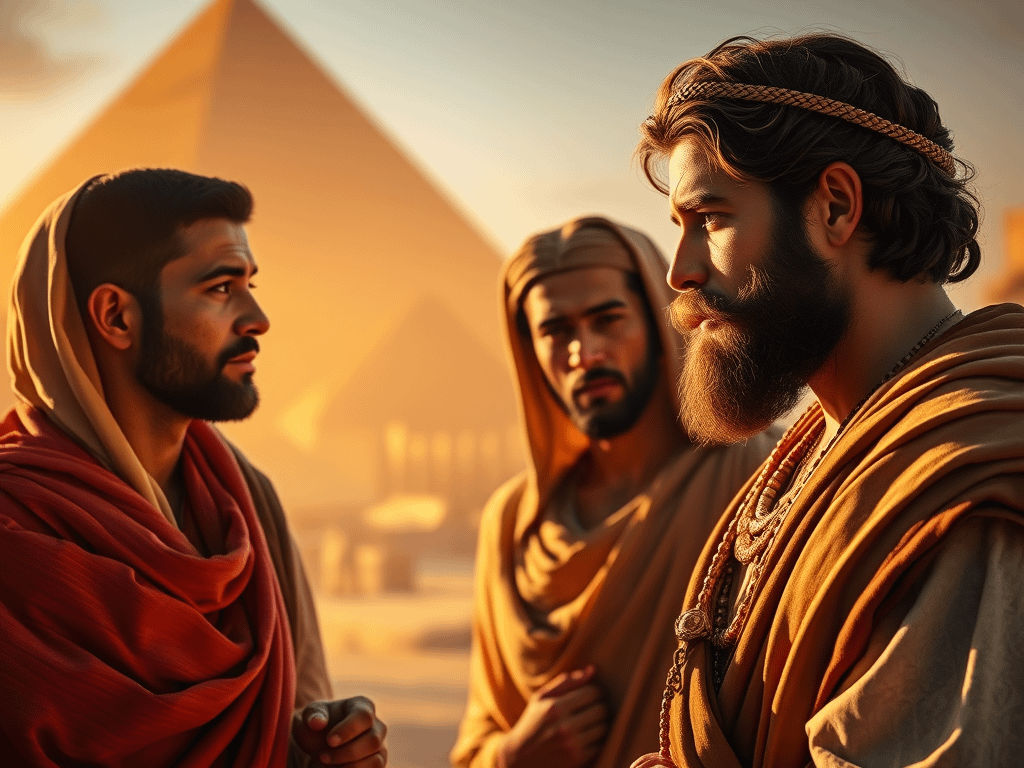Genesis for Beginners: A Step-by-Step Bible Study Guide
Genesis for Beginners: Have you ever pondered the origins of life and the universe? The Book of Genesis, a foundational text in both the Jewish and Christian traditions, offers an intriguing exploration of these profound themes.
Its narratives have captivated scholars, theologians, and laypeople for centuries, providing insights not only into the beginnings of the world but also into human nature and divine interaction.
With its various stories, from the creation of the world to the journeys of patriarchs, Genesis lays the groundwork for understanding the remaining portions of the Bible.
Genesis is not just an ancient script; it is a rich tapestry of literary styles, cultural insights, and spiritual lessons.
Each story within its chapters provides a glimpse into the spiritual and moral frameworks that have shaped Western civilization.
As we embark on this journey through Genesis for beginners, we will explore the significance of its stories, the symbolism behind its characters, and the messages that continue to resonate through millennia.
Join us on this enlightening exploration to unearth the timeless wisdom held within the first book of the Bible.
The Structure of Genesis: An Overview
Understanding the structure of Genesis is crucial for comprehending its themes and narratives. The book is traditionally divided into two primary sections: the primeval history (chapters 1–11) and the patriarchal narratives (chapters 12–50).
Each section collectively serves to convey history, theology, and genealogical records.
| Part | Chapters | Main Focus |
|---|---|---|
| Primeval History | 1-11 | Creation and Early Humanity |
| Patriarchal Narratives | 12-50 | Stories of Abraham, Isaac, Jacob, and Joseph |
| The Creation | 1-2 | Origin of the World |
| The Flood | 6-9 | Noah and Divine Judgement |
| Abraham’s Journey | 12-25 | Covenant and Faith |
| Joseph’s Rise | 37-50 | Family Dynamics and God’s Providence |
The first section, containing the well-known stories of Creation, the Fall, the Flood, and the Tower of Babel, sets a theological framework for understanding humanity’s relationship with God.
The second section follows the lives of the patriarchs, Abraham, Isaac, Jacob, and Joseph, illustrating the personal and covenantal relationships integral to biblical faith.
The Creation and the Fall
The Book of Genesis begins with the familiar declaration, “In the beginning, God created the heavens and the earth.”
The Creation narrative in Genesis 1 lays out a systematic account of how God, in a series of divine commands, brought about the universe, culminating in the creation of humankind, emphasizing humanity’s unique status as made in “the image of God.”
This chapter sets the stage for biblical cosmology and theology by asserting the intentional and orderly nature of God’s creative work.
Following the majestic account of creation is the more personal and intimate narrative of the Garden of Eden in Genesis 2 and 3. Here, God creates Adam and Eve to inhabit and tend the garden, granting them freedom with only a single prohibition.
The introduction of the serpent and the subsequent fall from grace presents a pivotal moment in biblical history — the introduction of sin and the complexities of human free will.
The consequences of this narrative set the stage for the ensuing biblical story, exploring themes of disobedience, divine justice, and mercy.
“The human story is the tale of creation and fall — lost, buried, but not annihilated.”

The Flood and the Covenant with Noah
As humanity’s transgressions multiply, the narrative shifts to the story of Noah and the Flood in Genesis 6 through 9.
In a world filled with corruption and violence, Noah stands out as a righteous figure, chosen by God to preserve the remnant of life through an impending deluge.
The account of the Ark, the gathering of animals, and the forty days of rain reminds readers of both the severity of divine judgment and the promise of redemption.
When the floodwaters recede, God establishes a covenant with Noah, symbolized by the rainbow, a divine promise never to destroy the earth with a flood again.
Noah’s story emphasizes themes of obedience, faith, and renewal. The covenant made with Noah represents God’s enduring commitment to creation, a theme that permeates throughout the Genesis narrative and echoes throughout the Bible.
Abraham and the Birth of Faith
Turning to the patriarchal narratives, we encounter Abraham, the central figure of Genesis chapters 12 through 25.
Often referred to as the “Father of Faith,” Abraham’s journey is marked by episodes of trust and obedience to God’s call, most notably his willingness to leave his homeland and later to sacrifice his son Isaac.
These narrative arcs illustrate the development of the Abrahamic Covenant, a pivotal moment in biblical dialogue, promising Abraham descendants as numerous as the stars and land for his posterity.
The character of Abraham exemplifies the essence of faith in action and its implications. His relationship with God is marked by promises that traverse beyond his lifetime, forming the foundational blocks for Israel’s religious identity.
The tales of Abraham highlight the relational aspect of biblical theology and underscore the reciprocal nature of divine promises and human faithfulness.
Isaac and Jacob: Continuation of the Covenant
The narrative continues with the stories of Isaac (Genesis 24–26) and Jacob (Genesis 27–36), both of whom inherit the covenantal promise granted to Abraham.
Isaac’s life is less detailed, focusing on the continuity of Abraham’s lineage and God’s faithfulness through trials and adversity. Jacob’s story, however, is intricate, filled with sagas of sibling rivalry, divine encounters, and personal transformation.
His infamous wrestling with God and subsequent renaming as Israel holds significant theological importance, depicting the challenging and transformative aspects of spiritual encounters.
Jacob’s story highlights themes of perseverance, deception, and divine favor. Despite his flawed nature, Jacob’s life reflects the complexity of divine-human interactions, underscoring core themes of mercy and election.
His narrative sets the stage for the formation of the twelve tribes of Israel, adding layers of meaning to the evolving story of God’s people.
Joseph: A Tale of Providence and Reconciliation
One of the most dramatic and moving parts of Genesis is the story of Joseph (Genesis 37–50). Sold into slavery by his jealous brothers, Joseph’s journey from bondage in Egypt to a position of power is a powerful testament to the themes of divine providence and reconciliation.
Through trials and tribulations, Joseph remains faithful to God’s guidance, ultimately rising to Egyptian authority and orchestrating the survival of his family during a famine.
Joseph’s tale is a profound exploration of resilience, forgiveness, and divine purpose. It illustrates the remarkable ability of divine providence to turn human intentions and actions, even those meant for harm, into instruments of salvation and blessing.
Joseph’s reunion and forgiveness of his brothers serve as a closing arc to the family’s story, bringing Genesis to a morally and spiritually resonant close.

Interpretative Approaches to Genesis
The Book of Genesis has been subject to extensive interpretation, fostering diverse perspectives across cultures and epochs. Among the primary approaches are the literal, allegorical, and theological readings, each offering unique insights into the text’s meanings and implications.
1- Literal Interpretation**: This approach considers the text as a straightforward historical account, focusing on understanding Genesis within its cultural and historical context.
It seeks to comprehend the events recorded as accurate historical narratives, affording insights into ancient civilizations and their interactions with the divine.
2- Allegorical Interpretation**: This method interprets Genesis symbolically, seeking deeper spiritual truths embedded within the narratives.
This perspective sees the events and characters as metaphors for underlying theological and moral themes, inviting readers to explore more profound existential questions.
3- Theological Interpretation**: Central to this approach is viewing Genesis as a tapestry of divine teaching, focusing on understanding the nature, character, and intentions of God as illustrated through the narratives.
Theological interpretations emphasize the relationship between the Creator and creation, exploring divine justice, mercy, and covenantal relationships within the text.
These interpretative avenues reveal the depth and richness of Genesis as a multifaceted text, encouraging ongoing exploration and dialogue.
Conclusion: The Lasting Legacy of Genesis
In conclusion, the Book of Genesis stands as a profound and enduring testament to the origins not only of the world but of faith itself.
Its stories continue to resonate with believers and non-believers alike, offering rich sources of spiritual and moral reflection.
Genesis invites readers to embark on a journey of discovery, where the interplay of divine intention and human action unfolds, reflecting the timeless relationship between Creator and creation.
As one delves into its pages, Genesis challenges, inspires, and offers profound insights into the nature of existence and the divine purposes woven throughout history.
Its legacy endures, providing foundational narratives and theological paradigms essential for understanding the Bible and the continuation of its message through generations.
FAQ – Dúvidas Comuns
What is the primary focus of Genesis?
Genesis primarily focuses on the origins of the world, humanity, and the foundational covenants between God and the patriarchs of Israel.
How is the Creation narrative structured?
The Creation narrative is divided into two main chapters, with Genesis 1 providing a structured cosmology and Genesis 2 offering a more intimate account within the Garden of Eden.
What is the significance of Noah’s Covenant?
Noah’s Covenant signifies God’s promise never to destroy the earth with a flood again, symbolized by the rainbow and emphasizing themes of renewal and divine mercy.
Who are the patriarchs of Genesis?
The patriarchs of Genesis are Abraham, Isaac, Jacob, and Joseph, key figures in the narrative who embody the development of God’s covenantal promises.
What is the overarching theme of the Joseph narrative?
The Joseph narrative focuses on themes of divine providence, resilience in adversity, and familial reconciliation, highlighting God’s purposes through human actions.







